人教版八年级上册_Unit2知识点讲解与练习
人教版初中英语8年级上册Unit2 知识清单 习题 (含答案)
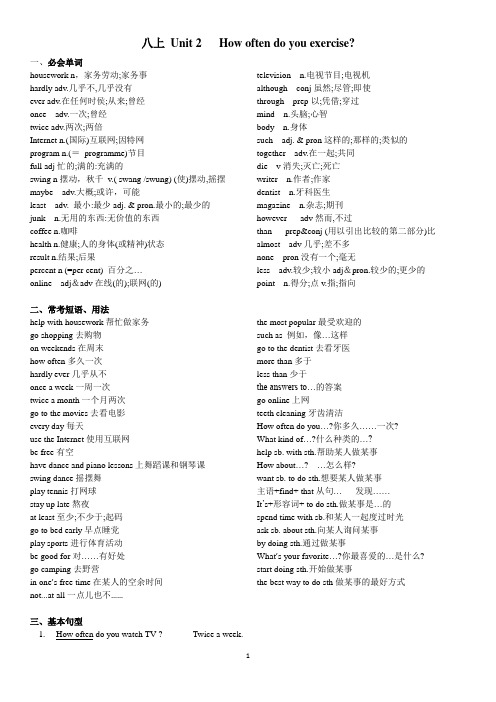
八上Unit 2 How often do you exercise?一、必会单词housework n,家务劳动;家务事hardly adv.几乎不,几乎没有ever adv.在任何时侯;从来;曾经once adv.一次;曾经twice adv.两次;两倍Internet n.(国际)互联网;因特网program n.(=programme)节目full adj忙的;满的:充满的swing n摆动,秋千v.( swang /swung) (使)摆动,摇摆maybe adv.大概;或许,可能least adv. 最小:最少adj. & pron.最小的;最少的junk n.无用的东西:无价值的东西coffee n.咖啡health n.健康;人的身体(或精神)状态result n.结果;后果percent n (=per cent) 百分之…online adj&adv在线(的);联网(的) television n.电视节目;电视机although conj虽然;尽管;即使through prep以;凭借;穿过mind n.头脑;心智body n.身体such adj. & pron这样的;那样的;类似的together adv.在一起;共同die v消失;灭亡;死亡writer n.作者;作家dentist n.牙科医生magazine n.杂志;期刊however adv然而,不过than prep&conj (用以引出比较的第二部分)比almost adv几乎;差不多none pron没有一个;毫无less adv.较少;较小adj&pron.较少的;更少的point n.得分;点v.指;指向二、常考短语、用法help with housework帮忙做家务go shopping去购物on weekends在周末how often多久一次hardly ever几乎从不once a week一周一次twice a month一个月两次go to the movies去看电影every day每天use the Internet使用互联网be free有空have dance and piano lessons上舞蹈课和钢琴课swing dance摇摆舞play tennis打网球stay up late熬夜at least至少;不少于;起码go to bed early早点睡党play sports进行体育活动be good for对……有好处go camping去野营in one’s free time在某人的空余时间not...at all一点儿也不……the most popular最受欢迎的such as 例如,像…这样go to the dentist去看牙医more than多于less than少于the answers to…的答案go online上网teeth cleaning牙齿清洁How often do you…?你多久……一次?What kind of…?什么种类的…?help sb. with sth.帮助某人做某事How about…? …怎么样?want sb. to do sth.想要某人做某事主语+find+ that从句…发现……It’s+形容词+ to do sth.做某事是…的spend time with sb.和某人一起度过时光ask sb. about sth.向某人询问某事by doing sth.通过做某事What’s your favorite…?你最喜爱的…是什么? start doing sth.开始做某事the best way to do sth做某事的最好方式三、基本句型1.--- How often do you watch TV ? ---Twice a week.2.--- What does she do on weekends? ---She sometimes goes shopping.3. It is healthy for the mind and the body.4.---How many hours do you usually sleep at night? ---Eight or more.四、单元语法:频度副词l.含义:表示事情发生频率的副词称为频度副词。
八年级上册英语unit2知识点人教版

八年级上册英语unit2知识点人教版Unit2主要涉及的知识点包括:一般现在时、第三人称单数形式、时间状语、频率副词、情态动词can及其用法、情态动词must及其用法、情态动词should及其用法。
一、一般现在时一般现在时是表示经常性、习惯性或普遍真理的动作或状态。
其构成为“主语+现在时动词原形”。
例如:She sings very well. (她唱歌非常好。
)He usually goes to school by bike. (他通常骑自行车上学。
)二、第三人称单数形式第三人称单数形式是在一般现在时的基础上加上s或es。
需要注意的是,如果动词以sh、ch、x、o结尾,应在动词后面直接加es。
例如:He plays basketball very well. (他打篮球非常好。
)She teaches English to us. (她教我们英语。
)三、时间状语时间状语是指在句子中修饰时间的词汇。
常用的时间状语包括:always、usually、often、sometimes、rarely、never等。
例如:I always get up early in the morning. (我总是早起。
)He never eats junk food. (他从不吃垃圾食品。
)四、频率副词频率副词是指表示动作发生次数的副词。
常用的频率副词包括:always、usually、often、sometimes、rarely、never等。
例如:We usually eat breakfast at home. (我们通常在家吃早餐。
)She rarely goes to the movies. (她很少去看电影。
)五、情态动词can及其用法can表示“能够”,用于表示某人能够做某事。
can的否定式为can't。
例如:I can swim very well. (我会游泳。
)He can't play soccer. (他不会踢足球。
Unit2知识点详解22-23人教版英语八年级上册
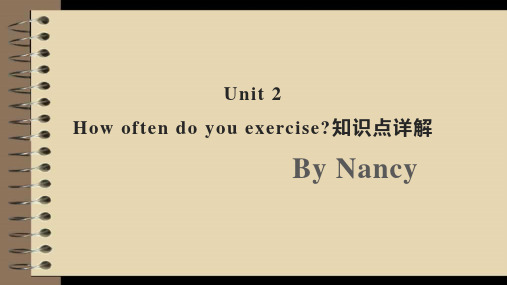
C. as
D. as examples
● 9. Mike's grandfather
last year. His
made Mike very sad.
● A. died; dead
B. dead; death C. died; death D. death; died
● 10. _______ our teacher is ill, ______ he still comes to our class to teach us.
of fashion. ● 3. Lin Tao walked through the hall and went into the library. ● 4. Forty percent of the students in our class ___a_re___ (be) afraid to go
句子。
●4.through prep.以;凭借;依靠 ●【考点】① through一般指穿过森林,穿过窗户,或者抽象
的物体等 ● ② 固定搭配:go through经历 get through 接通
●5.mind n./v.
●【考点】①n. 头脑,心智 keep sth in mind把...牢记在心
●14.help sb. with sth.= help sb. (to) do sth.帮助某人做某 事
●e the Internet使用网络 ●16.once a week 一周一次 ●17.twice a month 一月两次
●18.go to the movies去看电影 ●19.stay up late熬夜到很晚 ●20.swing dance摇摆舞
● 4. —Would you like some more bread?
人教新目标英语八年级上册Unit2知识讲解+练习题(含答案)
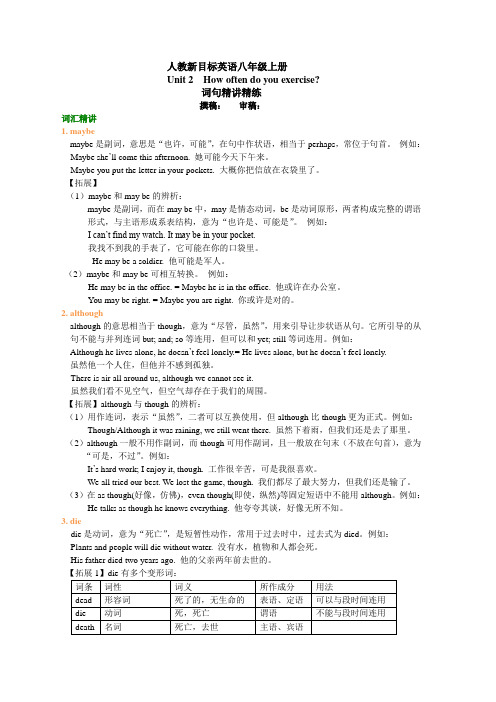
人教新目标英语八年级上册Unit 2 How often do you exercise?词句精讲精练撰稿:审稿:词汇精讲1. maybemaybe是副词,意思是“也许,可能”,在句中作状语,相当于perhaps,常位于句首。
例如:Maybe she’ll come this afternoon. 她可能今天下午来。
Maybe you put the letter in your pockets. 大概你把信放在衣袋里了。
【拓展】(1)maybe和may be的辨析:maybe是副词,而在may be中,may是情态动词,be是动词原形,两者构成完整的谓语形式,与主语形成系表结构,意为“也许是、可能是”。
例如:I can’t find my watch. It may be in your pocket.我找不到我的手表了,它可能在你的口袋里。
He may be a soldier. 他可能是军人。
(2)maybe和may be可相互转换。
例如:He may be in the office. = Maybe he is in the office. 他或许在办公室。
You may be right. = Maybe you are right. 你或许是对的。
2. althoughalthough的意思相当于though,意为“尽管,虽然”,用来引导让步状语从句。
它所引导的从句不能与并列连词but; and; so等连用,但可以和yet; still等词连用。
例如:Although he lives alone, he doesn’t feel lonely.= He lives alone, but he doesn’t feel lonely.虽然他一个人住,但他并不感到孤独。
There is air all around us, although we cannot see it.虽然我们看不见空气,但空气却存在于我们的周围。
人教版八年级上册英语unit2重难点知识点梳理扩展

人教版八年级上册unit2知识点梳理及拓展CONTENT本讲课程内容:八上《新目标》Unit 2 How often do you exercise?Part 1 vocabulary 高频单词短语Part 2 grammar 语法要点Part 3 exercise 真题训练Unit 2 How often do you exercise?Part 1 vocabulary高频单词短语1. Next week is quite full for me.●---Do you need some more cakes? ---No, thanks, I am full. 吃饱的●I really had a full week so I don’t want to go out today.忙碌的●He has been studying in the new school for a full year. 完整的,整个的●The glass is full of water.装满的词组积累:●full marks满分●live a full life过着充实的生活●be full of 充满2. She says it’s good for my health.●keep / be in good health 健康状况好●keep / be in bad / poor health 健康状况不好●keep healthy/ fit 保持健康● a healthy lifestyle健康的生活方式3. Here are the results.●His illness is the result of a car accident …的结果(后加原因)●He made one big mistake, and as a result, lost his job. 作为结果4. We think the best way to relax is through exercise.●prep.We got the news through him. 通过;以,凭借I tried to call you but I couldn't get through. (电话)接通He will not live through the night. 在整个期间,自始至终I didn’t get through the exams. 通过●adj.Are you through with the computer yet ? 完成(某事);用完(某物)I’m through with you ! 与(某人)关系完结5. and you can spend time with your friends and family as you play together.●conj.She doesn’t sing as well as her sister. 和…一样When in Rome,do as Romans do. 按照…的方式;如同As my mother isn’t at home,we have to eat out. 由于;因为As time goes on, we'll grow up. 随着;当…的时候众所周知as everyone knows / as far as we know●prep.Dad dressed up as Santa Claus. 作为5. Old habits die hard.●1)死;死亡The man died young, at the age of 27.死于die of hunger/cancer/illnessdie from an earthquake/ an accident●2)消亡;消失Our love will never die. 我们的爱始终不渝。
人教版八年级英语上册Unit 2重要知识点讲解

Unit2How often do you exercie?重要知识点讲解惯用法:1. help sb. with sth 帮助某人做某事2. How about…? ….怎么样?/ ….好不好?3. want sb. to do sth. 想让某人做某事4. How many + 可数名词复数+ 一般疑问句….有多少…..5. 主语+ find+ that 从句…发现…6. It’s + adj.+ to do sth. 做某事是….的7. spend time with sb. 和某人一起度过时光8. ask sb. about sth. 向某人询问某事9. by doing sth. 通过做某事10. What’s your favorite…..? 你最喜欢的……是什么?11 start doing sth. 开始做某事12. the best way to do sth.做某事的最好方式词语辨析:1. how often 多久一次,用来提问动作发生的频率。
回答用:once,twice, three times 等词语。
How often do you play sports? Three times a week.how long 多长,用来询问多长时间,也可询问某物有多长。
How long does it take to get to Shanghai from here? How long is the ruler?how for 多远,用来询问距离,指路程的远近。
How far is it from here to the park? It’s about 2 ki lometers.2.free 空闲的,有空的,反义词为busy.be free 有空,闲着,相当于have time.I’ll be free next week. = I’ll have time next week.还可作“免费的、自由的”解。
人教版英语八年级上册Unit2知识点总结与训练
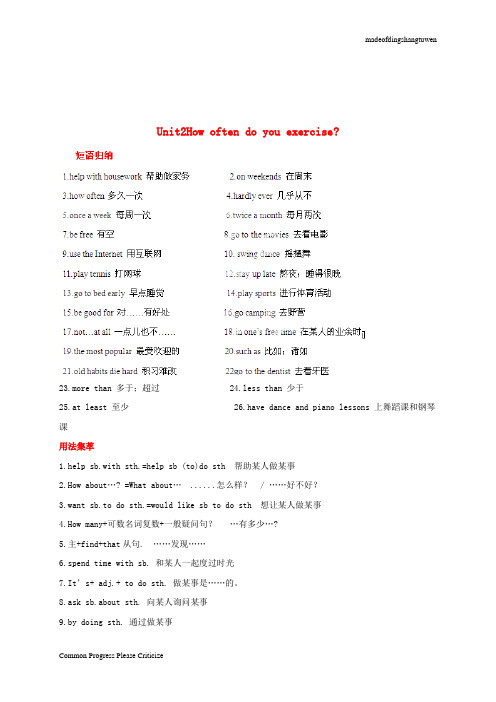
Unit2How often do you exercise?23.more than 多于;超过 24.less than 少于25.at least 至少 26.have dance and piano lessons 上舞蹈课和钢琴课用法集萃1.help sb.with sth.=help sb (to)do sth 帮助某人做某事2.How about…? =What about… ......怎么样? / ……好不好?3.want sb.to do sth.=would like sb to do sth 想让某人做某事4.How many+可数名词复数+一般疑问句?…有多少…?5.主+find+that从句. ……发现……6.spend time with sb. 和某人一起度过时光7.It’s+ adj.+ to do sth. 做某事是……的。
8.ask sb.about sth. 向某人询问某事9.by doing sth. 通过做某事10.What’s your favorite……? 你最喜爱的…是什么?11.the best way to do sth. 做某事的最好方式12.(1).不确定的频度副词:表示动作发生间隔(既频率)的副词。
它们有:always ; usually ; often ; sometimes ; seldom ; hardly ever ; never 等。
always(100%)> usually(约80%~90%)> often(约60%)> sometimes(约30%)> seldom(约20%)> hardly ever(约10%)> never(0%)在句中位置: 频度副词在句中通常放在be动词、助动词、情态动词之后, 在实义动词之前。
She is often late for school./I can never be sure./He always helps me.(2).表示确定的频率短语every day/week/month/year 每天/周/月/年;once a week 每周一次 ; twice a week 每周两次; twice a month 一月两次;three times a day 一天三次。
人教版英语八年级上册Unit2知识点总结与训练
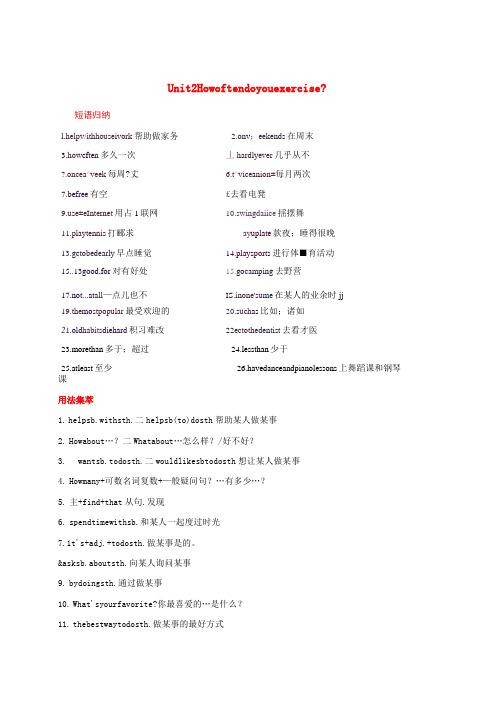
Unit2Howoftendoyouexercise?短语归纳l.helpv/ithhouseivork帮助做家务 2.onv;eekends在周末3.how cften多久一次丄hardlyever几乎从不.oncea^veek每周?丈 6.t^vice a nion±每月两次7.befree有空£去看电凳e±eInternet用占1联网10.swingdaiice揺摆舞11.playtennis打郦求ay uplate款夜;睡得很晩13.gctobedearly早点睡觉14.playsports进行体■育活动15..13good,for对有好处15.gocamping去野营17.not...at all—点儿也不IS.inone's ume在某人的业余时jj19.the mo stpopular最受欢迎的20.such as比如;诸如21.old habits diehard积习难改22ec tothe dentist去看才医23.morethan多于;超过24.lessthan少于25.atleast至少26.havedanceandpianolessons上舞蹈课和钢琴课用法集萃1.helpsb.withsth.二helpsb(to)dosth帮助某人做某事2.Howabout…?二Whatabout…怎么样?/好不好?3.wantsb.todosth.二wouldlikesbtodosth想让某人做某事4.Howmany+可数名词复数+—般疑问句?…有多少…?5.主+find+that从句.发现6.spendtimewithsb.和某人一起度过时光7.1t's+adj.+todosth.做某事是的。
&asksb.aboutsth.向某人询问某事9.bydoingsth.通过做某事10.What'syourfavorite?你最喜爱的…是什么?11.thebestwaytodosth.做某事的最好方式。
人教版英语八年级上册Unit 2知识点详解及练习

Unit2 How often do you exercise?1. hardly /hɑ:dlɪ/ adv. 几乎不,几乎没有1. Zhang Hao ____ watches TV. He likes using the Internet.A. hard everB. hardly everC. doesn’t hard everD. doesn’t hardly ever2. He hardly does his homework at home, ____?A. is heB. isn’t heC. does heD. doesn’t he【参考答案】1. B 2. C2. once /wʌns/ adv. 一次,曾经I go shopping with my mother _____ a month.A. one timeB. two timesC. onceD. three time 【参考答案】C3. twice /twaɪs/ adv. 两次,两倍We should think _____ before we make a decision.A. carefulB. twiceC. onceD. three times 【参考答案】B4. Internet /'ɪntənet/ n. (国际)互联网,因特网How often do you ______?A. find the InternetB. surf the internetC. surf the InternetD. find the internet【参考答案】C5. full /fʊl/ adj. 忙的;满的,充满的The glass _____ water.A. fillB. filled withC. full ofD. is full of 【参考答案】D6. maybe /'meɪbɪ/ adv. 大概,或许,可能辨析:maybe与may be—Did you see Richard?—No. he is in the playground.A. MightB. May beC. MaybeD. May 【参考答案】C7. at least 至少,不少于,起码Although the food I cooked wasn't delicious, _____ I could cook myself.A. at leastB. at lastC. because ofD. at all 【参考答案】A8. percent /pə'sent/ n. 百分之……1. Fifteen percent of the students __________ (come) from China.2. Thirty percent of his hair _____ (be) white.【参考答案】come, is9. online /ˌɒnˈlaɪn/ adj.&adv. 在线(的),联网(的)1. 一些在线游戏非常有趣。
八年级上册英语人教版unit2知识点
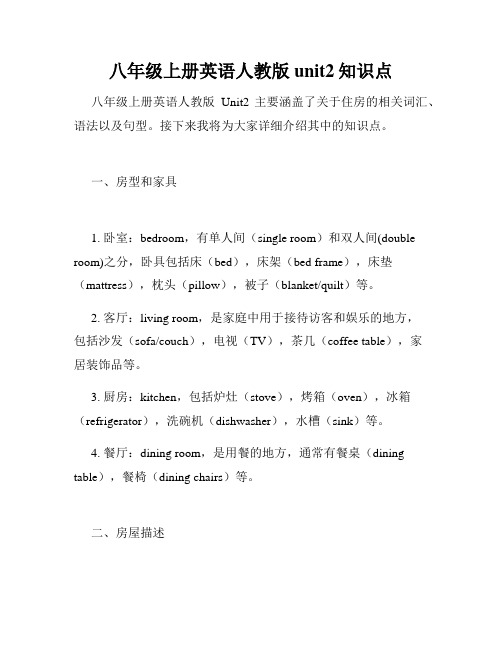
八年级上册英语人教版unit2知识点八年级上册英语人教版Unit2主要涵盖了关于住房的相关词汇、语法以及句型。
接下来我将为大家详细介绍其中的知识点。
一、房型和家具1. 卧室:bedroom,有单人间(single room)和双人间(double room)之分,卧具包括床(bed),床架(bed frame),床垫(mattress),枕头(pillow),被子(blanket/quilt)等。
2. 客厅:living room,是家庭中用于接待访客和娱乐的地方,包括沙发(sofa/couch),电视(TV),茶几(coffee table),家居装饰品等。
3. 厨房:kitchen,包括炉灶(stove),烤箱(oven),冰箱(refrigerator),洗碗机(dishwasher),水槽(sink)等。
4. 餐厅:dining room,是用餐的地方,通常有餐桌(dining table),餐椅(dining chairs)等。
二、房屋描述1. 地理位置:the location of the house。
例如:Our new house is located at the heart of the city.2. 房屋类型:the type of the house。
例如:She lives in a two-story house with a garden.3. 房屋朝向:the orientation of the house。
例如:Our house faces east, so we can enjoy the sunrise every morning.4. 房间大小:the size of the room。
例如:The living room is spacious enough to accommodate a large sofa and a coffee table.5. 装修风格:the style of the decoration。
Unit2Howoftendoyouexercise知识点详解及练习 人教版八年级英语上册
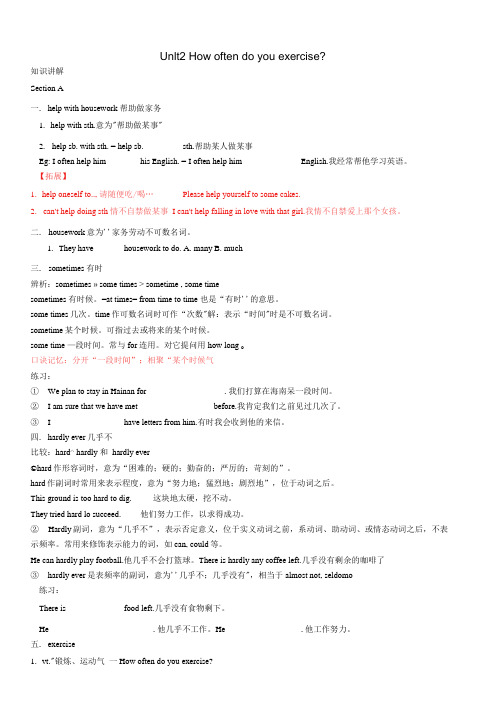
Unlt2 How often do you exercise?知识讲解Section A一. help with housework 帮助做家务1.help with sth.意为"帮助做某事"2.help sb. with sth. = help sb. ________ sth.帮助某人做某事Eg: I often help him _______ his English. = I often help him _____________ English.我经常帮他学习英语。
【拓展】1.help oneself to.., 请随便吃/喝…Please help yourself to some cakes.2.can't help doing sth 情不自禁做某事I can't help falling in love with that girl.我情不自禁爱上那个女孩。
二. housework意为''家务劳动不可数名词。
1.They have ______ housework to do. A. many B. much三. sometimes 有时辨析:sometimes » some times > sometime , some timesometimes 有时候。
=at times= from time to time 也是“有时''的意思。
some times几次。
time作可数名词时可作“次数"解:表示“时间"时是不可数名词。
sometime某个时候。
可指过去或将来的某个时候。
some time —段时间。
常与for连用。
对它提问用how long o口诀记忆:分开“一段时间”;相聚“某个时候气练习:①We plan to stay in Hainan for _________________ .我们打算在海南呆一段时间。
人教版初二英语八年级上册Unit2知识点

人教版初二英语八年级上册Unit2知识点Unit2 How often do you exercise?【重点语法】1. 频率副词: always,usually, often, sometimes, never频率副词在句中通常放在实义动词之前, be动词或助动词之后。
常用于一般现在时态中。
2.“次数”的表达方法一次once,两次twice,三次或三次以上:基数词+ times, 如:three times, five times,3. how often“多久一次”问频率,回答常含有频率词组或短语。
常见的how疑问词:1)How soon 多久(以后)—How soon will he be back?他多久能回来?—He will be back in amonth. 他一个月后能回来。
2)how long “多久”—How long did it take you toclean the house? 你打扫房子用了多久?—It took me half an hour to cleanthe house. 我打扫这房子用了半小时。
3)How many+名复How much+不可名“多少” 问数量(how much 还可问价格)【重点短语】1. go to the movies 去看电影2. look after = take care of 照顾3. surf the internet 上网4. healthy lifestyle 健康的生活方式5. go skate boarding 去划板6. keep healthy=stay healthy 保持健康7. eating habits 饮食习惯8. take more exercise 做更多的运动9. the same as 与什么相同10. be different from 不同11. once a month一月一次12. twice a week一周两次13. make a difference to 对......有影响/作用14. most of the students=moststudents15. shop=go shopping=do someshopping 购物16. be good for 对......有益17. be bad for 对......有害18. come home from school放学回家19. of course = certainly = sure 当然20. get good grades 取得好成绩21. keep/be in good health 保持健康22. take a vacation 去度假【词语辨析】1.maybe / may bemaybe 是副词,意为“大概,可能,或许”,一般用于句首。
人教版八年级上册英语Unit 2知识点梳理及语法讲义(学生版)
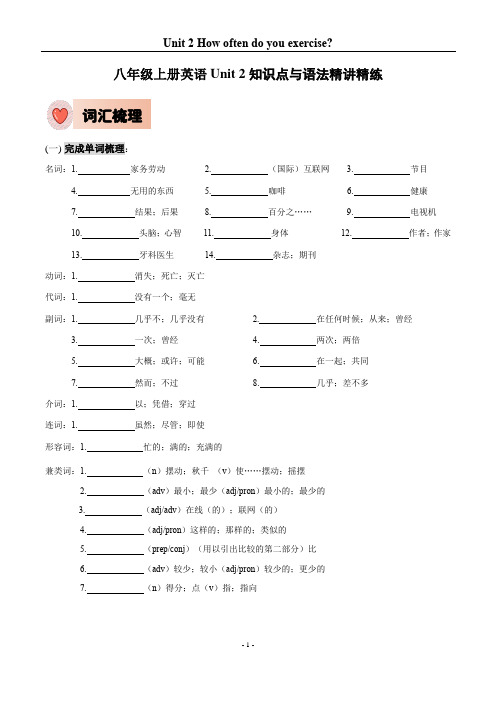
八年级上册英语Unit 2知识点与语法精讲精练词汇梳理(一)完成单词梳理:名词:1. 家务劳动 2. (国际)互联网 3. 节目4. 无用的东西5. 咖啡6. 健康7. 结果;后果8. 百分之……9. 电视机10. 头脑;心智11. 身体12. 作者;作家13. 牙科医生14. 杂志;期刊动词:1. 消失;死亡;灭亡代词:1. 没有一个;毫无副词:1. 几乎不;几乎没有 2. 在任何时候;从来;曾经3. 一次;曾经4. 两次;两倍5. 大概;或许;可能6. 在一起;共同7. 然而;不过8. 几乎;差不多介词:1. 以;凭借;穿过连词:1. 虽然;尽管;即使形容词:1. 忙的;满的;充满的兼类词:1. (n)摆动;秋千(v)使……摆动;摇摆2. (adv)最小;最少(adj/pron)最小的;最少的3. (adj/adv)在线(的);联网(的)4. (adj/pron)这样的;那样的;类似的5. (prep/conj)(用以引出比较的第二部分)比6. (adv)较少;较小(adj/pron)较少的;更少的7. (n)得分;点(v)指;指向(二) 词汇变形小结:1. one (num. 一) — (adv. 一次) — (第一)2. two (num. 二) — (adv.两次)— (第二)3. swing (v. 使……摆动) — (过去式)4. little (adj. 少的) — (比较级:更少的) — (最高级:最少的)5. health (n. 健康) — (adj. 健康的) — (adv. 健康地)— (反义词:不健康的) — (反义词:不健康地)6. die (v. 死) — (n. 死亡) — (adj. 垂死的) — (adj. 死的)7. write (v. 写) — (n. 作者;作家)【练一练】用所给词的适当形式填空1.Most parents don’t think it is ______________(health)for children to stay up too late at night.o She is a great ______________(write)and he’s especially famous for his play, Teahouse.3.If people don’t exercise, the illness can go into their ______________ (body) easily.4.It takes ______________(little)time to go there by underground than by bus.5.Jim got ten ______________ (point)in the basketball match.6.Take the medicine______________(two) a day, and you’ll feel better.7.Jack ______________(do) his homework every day.8.Mr. Li______________(teach) English in our school five years ago.9.At______________(little)ten students were late for school this morning.10.Many boys like playing football because they think it’s______________(relax).(三) 短语攻关:在周末上网几乎从不多久一次一周一次一周两次一周四到六次使用互联网去看电影熬夜至少对……有好处做运动打网球在某人的空闲时间去看牙医摇摆舞做家务垃圾食品例如怎么会呢?……的答案多于少于知识点梳理1.help with housework 帮忙做家务【用法详解】help sb with sth 表示在某方面帮助某人(帮助某人做某事),with后常跟名词或代词作宾语。
八年级上册英语unit2知识点归纳人教版
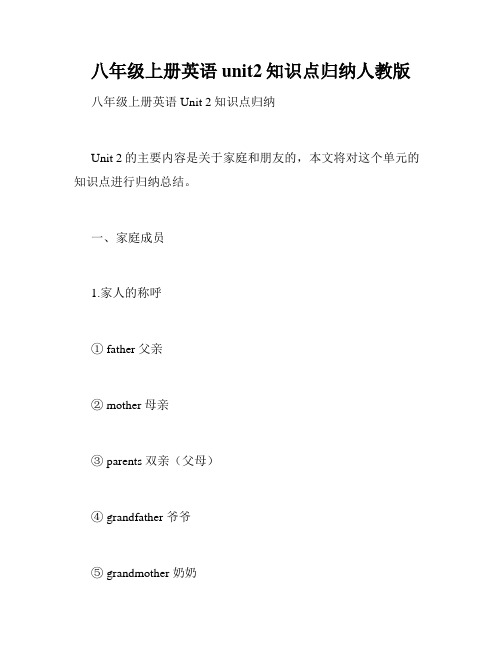
八年级上册英语unit2知识点归纳人教版八年级上册英语Unit 2知识点归纳Unit 2的主要内容是关于家庭和朋友的,本文将对这个单元的知识点进行归纳总结。
一、家庭成员1.家人的称呼① father 父亲② mother 母亲③ parents 双亲(父母)④ grandfather 爷爷⑤ grandmother 奶奶⑥ grandparents 祖父母(外公外婆或者爷爷奶奶)⑦ son 儿子⑧ daughter 女儿⑨ children 孩子⑩ elder brother 哥哥⑪ younger brother 弟弟⑫ elder sister 姐姐⑬ younger sister 妹妹2.家庭成员的职业father:teacher, doctor, businessman, worker…mother:nurse, musician, artist, housewife…grandfather / grandmother:retired, farmer, scientist, writer…brother / sister:student, athlete, musician, artist, …二、家务1.厨房用具① microwave 微波炉② refrigerator 冰箱③ stove 火炉④ oven 烤箱⑤ blender 搅拌器⑥ toaster 烤面包机⑦ kettle 水壶2.家务动词① cook 做饭② wash the dishes 洗碗③ sweep 扫地④ mop 拖地⑤ clean the bathroom 打扫浴室⑥ make the bed 整理床铺⑦ do the laundry 洗衣服三、朋友1.朋友类型① best friend 最好的朋友② close friend 亲密的朋友③ new friend 新朋友④ childhood friend 童年时的朋友⑤ schoolmate 同学2.谈论朋友的习惯和特点① He / She is always there for me. 他 / 她总是在我身边。
期中复习Unit2重点知识点汇总练习 人教版英语八年级上册
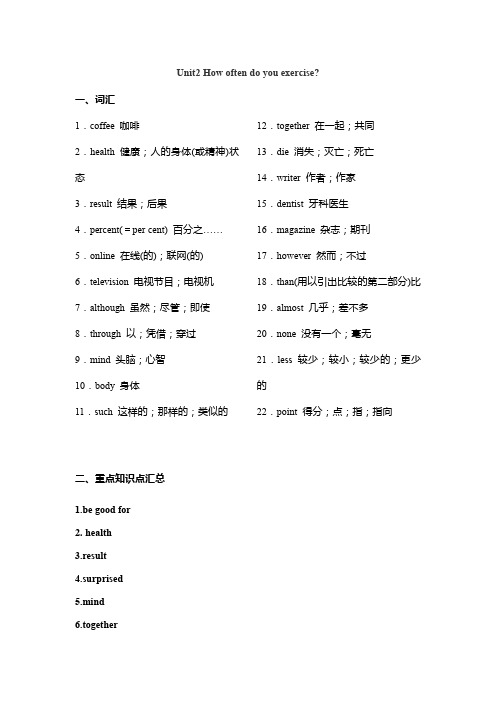
Unit2 How often do you exercise?一、词汇1.coffee 咖啡2.health 健康;人的身体(或精神)状态3.result 结果;后果4.percent(=per cent) 百分之……5.online 在线(的);联网(的) 6.television 电视节目;电视机7.although 虽然;尽管;即使8.through 以;凭借;穿过9.mind 头脑;心智10.body 身体11.such 这样的;那样的;类似的12.together 在一起;共同13.die 消失;灭亡;死亡14.writer 作者;作家15.dentist 牙科医生16.magazine 杂志;期刊17.however 然而;不过18.than(用以引出比较的第二部分)比19.almost 几乎;差不多20.none 没有一个;毫无21.less 较少;较小;较少的;更少的22.point 得分;点;指;指向二、重点知识点汇总1.be good for2.health3.result4.surprised5.mind6.together讲解版1.be good forbe good at擅长······be good to对······友好be good for对······有益处be good with善于应付······的;对······有办法2.healthin good health 健康状况良好;in poor health健康状况不好。
3.resultas a result结果,因此;as a result of由于······的原因,作为······结果;the result of······的结果。
初二人教版初中英语八年级上册Unit2必考知识点梳理

Unit2 How often do you exercise?【重点语法】1. 频率副词: always, usually, often, sometimes, never频率副词在句中通常放在实义动词之前, be动词或助动词之后。
常用于一般现在时态中。
2.“次数”的表达方法一次 once,两次twice,三次或三次以上:基数词+ times, 如:three times, five times,3. how often“多久一次”问频率,回答常含有频率词组或短语。
常见的how疑问词:1)How soon 多久(以后)—How soon will he be back?他多久能回来?—He will be back in a month. 他一个月后能回来。
2)how long “多久”—How long did it take you to clean the house? 你打扫房子用了多久?—It took me half an hour to clean the house. 我打扫这房子用了半小时。
3)How many+名复How much+不可名“多少” 问数量(how much 还可问价格)【词语辨析】1. maybe / may bemaybe 是副词,意为“大概,可能,或许”,一般用于句首。
May be是情态动词,意为“可能是...,也许是...,大概是...”.The baby is crying. Maybe she is hungry.The woman may be a teacher.2. a few / few / a little / littlePeople can live to 100, but few people can live to 150. There is little time left. I won’t catch the first bus.Could you give me a little milk?3. hard / hardlyhard作形容词,意为“困难的,艰苦的,硬的”;作副词,意为“努力地,猛烈地”。
人教版初中英语-八年级上册-unit 2知识点+练习

初中英语题集八年级上unit2 How often do you exercise?一.词汇变形单词1.hardly adv.几乎不;简直不;刚刚——hard adj.困难的—— hardness n. 坚硬,硬性2.Internet n.因特网——international adj.国际的—— internationally adv. 国际性的;国际上的3.program n.节目;程序;课程;节目单——programmer n.程序设计者—— programmed v.训练培养4.full adj.满的;充满的;完全的—— fully adv.完全地;充分地—— fuller n. 漂洗工;套锤5.swing n.摇摆;秋千v.摇摆;旋转——swings n. 秋千—— swinging adj. 愉悦的多姿多彩的6.junk n.垃圾;废旧杂物——junky n.吸毒者adj.质量低劣的—— junket n.公费旅游7.health n.健康;人的身体或精神状态—— healthy adj.健康的,健全的—— healthily adv.健康地8.result n.结果;后果—— resulting adj.作为结果的,因而发生的—— resultant n.结果9.percent adj.百分之...的——percentage n.百分比—— percentile n. 百分位10.mind n.头脑;想法;意见;心思—— mindful adj.留心的;注意的——mindless adj. 愚笨的;不小心的11.die v.死;枯竭;消失—— dead adj.死去的完全的—— death n.死亡12.writer n.作者;作家—— writing n. 写作——write v.写13.dentist n.牙科医生—— dentistry n. 牙医学——dental adj.牙齿的牙科的14.teenager n.青少年—— teens n. 十几岁十三到十九的数字——teeny adj. 极小的15.point n.看法;要点;重点;小数点;目标;分数——pointed adj.尖锐的—— pointless adj.无意义的He (几乎不)watches TV.典型例题1.相似题1)She h (几乎不)eats anything.2)In the evening he h (几乎不)exercises.3)We could h (很难)believe our eyes.答案:hardly ever ;hardly ever; hardly ever; hardly2.Our questions were about exercise,use of the (互联网)and watching TV.相似题1)You can find all kinds of information on the (互联网).2)Most of the children like surfing the (互联网).3)(互联网)has changed our life.答案:internet;internet;internet;internet3.What is your favorite (节目)?相似题1)Mary likes the (节目)every much.2)The animal world is always kids’ favorite (节目).3)Tom and john all like the funny (节目).答案:program;program; program;program4.Next week is quiet (满的)for me.相似题1)Her life was too (满的)to find time for hobbies.2)Hotels are often (满的)at this time of the year.3)The bus was (满的)when they got there.答案:full;full;full;full5.Oh, (摇摆)dance,it’s fun.相似题1)(摇摆舞)is a kind of dancing.2)His moods alarmingly.他的心情时好时坏,令人担心.3)You’ve been on the for ten minutes,it’s my go now.你荡秋千有10分钟了,现在该轮到我了。
人教版八年级英语上册Unit2知识点和练习

人教版八年级英语上册Unit2知识点和练习Unit 2 What’s the matter?固定短语1. Have a cold 感冒2. sore back 背痛3. neck and neck 并驾齐驱,齐头并进4. I have a stomachache 我胃痛= I have got a stomachache= There is something wrong with my stomach= My stomach hurts= I have (got) a pain in my stomach5. What’s the matter? 怎么了?= What’s the trouble (with you)?= What’s your trouble?= What’s wrong (with you)?= What’ the matter (with you)?=What has happened to you?= Is there anything wrong (with you)? = what’s up?6. sore throat 咽喉痛7. lie down and rest 躺下休息8. see a dentist 看牙医9. drink lots of water 多喝水10. hot tea with honey 加蜂蜜的热茶11.That’s a good idea 好主意12.That’s too bad 太糟糕了13.I think so 我认为如此14. I’m not feeling well. 我觉得不太舒服= I’m not feeling fine/all right.= I’m feeling ill/sick. =I feel terrible/bad.= I don’t feel well.15. get some rest 多休息16. I have no idea = I don’t know 我不知道17. stressed out 筋疲力18. I am tired 我累了He is tired. 他累了19. a healthy lifestyle健康的生活方式20. traditional Chinese doctors传统中医21. a balance of yin and yang阴阳调和22. you have too much yin.你阴气太盛23. to eat a balance diet饮食平衡24. healthy food 健康食品25. stay healthy 保持健康=keep healthy=keep in good health= keep fit26. enjoy oneself (myself, yourself, herself, himself, themselves, ourselves, itself反身代词) 玩得高兴,过得愉快=have a good time = have a wonderful time= have fun27. enjoy sth. =like sth. (名词)喜欢某物,enjoy doing sth.喜欢做某事=like dong sthpractice doing sth.练习做某事,mind doing sth. 介意做某事,finish doing sth.完成某事,give up doing sth.放弃做某事,can’t help doing sth.忍不住做某事,keep ding sth. 坚持做某事. (keep on doing sth. / keep sb. doing sth. )be busy doing sth. 忙着做某事be used to doing sth.习惯于做某事make a contribution to doing sth.为..做贡献go on doing sth. 继续做某事forget doing sth.忘记做某事remember doing sth. 记得做某事spend....(in) doing sth. 花(时间)来做某事prefer doing sth.to doing sth.比起(做...)来更愿意(做...)28. at the moment = now 此刻29. Host family 东道家庭30. Conversation practice会话练习31. I’m sorry to hear that.听到此事我很难过Section A知识要点1. What’s the matter?这句话通常用于询问别人身体有什么不舒服,或有何麻烦,后跟with构成:What’s the matter with…?类似的句子还有:What’s wrong with…? What’s the trouble with…? 他们的答语往往是表示得了什么病,或什么地方不舒服,常用句型“somebody has/have a+相应的名词”。
人教版八年级上册英语Unit 2 知识点语法归纳总结
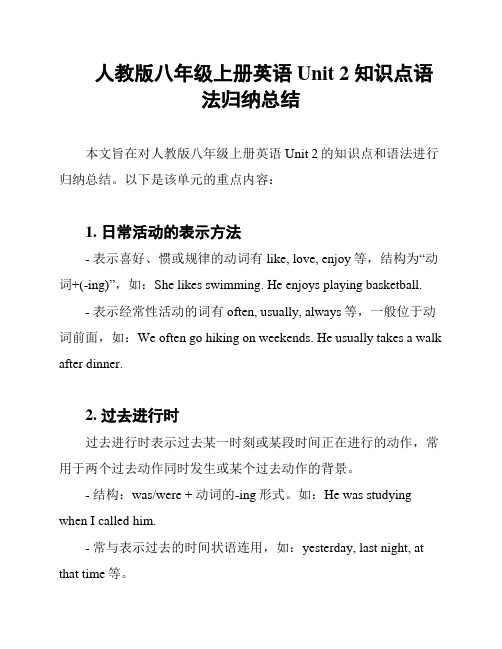
人教版八年级上册英语Unit 2 知识点语法归纳总结本文旨在对人教版八年级上册英语Unit 2的知识点和语法进行归纳总结。
以下是该单元的重点内容:1. 日常活动的表示方法- 表示喜好、惯或规律的动词有like, love, enjoy等,结构为“动词+(-ing)”,如:She likes swimming. He enjoys playing basketball.- 表示经常性活动的词有often, usually, always等,一般位于动词前面,如:We often go hiking on weekends. He usually takes a walk after dinner.2. 过去进行时过去进行时表示过去某一时刻或某段时间正在进行的动作,常用于两个过去动作同时发生或某个过去动作的背景。
- 结构:was/were + 动词的-ing形式。
如:He was studying when I called him.- 常与表示过去的时间状语连用,如:yesterday, last night, at that time等。
3. 被动语态的构成和用法- 构成:be + 过去分词。
如:The book was written by a famous author.- 主动句变被动句的转换方法:将主动句的宾语变为被动句的主语,原主语变为介词"by"的宾语。
如:She eats an apple.(主动句)→ An apple is eaten by her.(被动句)- 被动语态用于强调动作的承受者,或者当我们不知道或不关心动作的执行者是谁时。
4. 双宾语结构有些动词后面既可以跟一个间接宾语,也可以跟一个直接宾语,这种结构称为双宾语结构。
- 结构:动词 + 间接宾语 + 直接宾语。
如:She bought her sister a present.- 常见的双宾语动词有give, send, lend, teach等。
- 1、下载文档前请自行甄别文档内容的完整性,平台不提供额外的编辑、内容补充、找答案等附加服务。
- 2、"仅部分预览"的文档,不可在线预览部分如存在完整性等问题,可反馈申请退款(可完整预览的文档不适用该条件!)。
- 3、如文档侵犯您的权益,请联系客服反馈,我们会尽快为您处理(人工客服工作时间:9:00-18:30)。
Unit2 How often d o you exercise?Section A知识讲解一. help with housework 帮助做家务1. help with sth. 意为“帮助做某事”2. help sb. with sth. = help sb. _______ sth. 帮助某人做某事Eg: I often help him ______ his English. = I often help him __________ English. 我经常帮他学习英语。
【拓展】1. help oneself to… 请随便吃/喝···Please help yourself to some cakes.2.can’t help doing sth 情不自禁做某事I can’t help falling in love with that girl. 我情不自禁爱上那个女孩。
二.housework 意为“家务劳动”。
不可数名词。
1. They have housework to do. A. many B. much三. sometimes 有时辨析:sometimes ,some times ,sometime , some timesometimes 有时候。
=at times= from time to time也是“有时”的意思。
some times 几次。
time作可数名词时可作“次数”解;表示“时间”时是不可数名词。
sometime 某个时候。
可指过去或将来的某个时候。
some time 一段时间。
常与for连用。
对它提问用how long 。
口诀记忆:分开“一段时间” ;相聚“某个时候”。
练习:① We plan to stay in Hainan for . 我们打算在海南呆一段时间。
② I am sure that we have met before. 我肯定我们之前见过几次了。
③ I have letters from him. 有时我会收到他的来信。
四. hardly ever 几乎不①hard作形容词时,意为“困难的;硬的;勤奋的;严厉的;苛刻的”。
hard作副词时常用来表示程度,意为“努力地;猛烈地;剧烈地”This ground is too hard to dig. 这块地太硬,挖不动。
They tried hard to succeed. 他们努力工作,以求得成功。
②Hardly 副词,意为“几乎不”率。
常用来修饰表示能力的词,如can, could等。
He can hardly play football. 他几乎不会打篮球。
There is hardly any coffee left. 几乎没有剩余的咖啡了③hardly ever是表频率的副词,意为“几乎不;几乎没有”,相当于almost not, seldom。
练习:There is ______ ______food left. 几乎没有食物剩下。
He ______ ______ . 他几乎不工作。
He ______ ______. 他工作努力。
五.What’s your favorite...? =What... do you like best?你最喜欢的......是什么?1.What’s your favorite animal?你最喜欢的动物是什么?= __________________________________________六. free 意为“空闲的,有空的”反义词busy。
be free 意为“闲着,有空”eg::He is free now.他现在有空。
拓展:free还可译为“免费的”Eg:The tickets are free. 票是免费的。
七. quite full 很忙,相当忙.1. adj. full 还可译为“满的,充满的”。
反义词是empty,意为“空的”。
Eg:The bus was full when they got there. 翻译________________________________________.拓展:A be full of B. = A be fill with B; A中充满了B。
The room is full of students. The bus is full of people.The hall is _______ people. A. fill with B. full with C. filled of D. filled with2.full adj. “饱的”。
其反义词是hungry,意为“饥饿的”。
Are you hungry or full?你饿了还是饱了?Eg:I can’t eat any more,I am quite full. 我不能再吃了,我相当饱了。
八. maybe “也许,大概,可能”,常位于句首。
Eg:Maybe he knows Tom. 也许他认识Tom。
辨析:maybe 和may beLily an English teacher. Lily可能是一名英语老师。
=________________________________________九.at least 意为“至少”。
其反义词为at most “最多”。
Eg:There are at least 1,500 students in our school. _____________________________________。
十. how often意为“多久一次”,常用于对时间频率的提问。
回答可用once/twice/three times a day(一天一/两/三次),sometimes(有时),never(从不),very often(经常)等。
How often do you watch TV? 你多久看一次电视?【拓展】十一.look、see、watch和read辨析:look为不及物动词,后接宾语时须用介词at,指看的动作。
see着重于看的后果,即“看到,看见”。
read多指“看书、报”,这里的“看”实为“读”。
watch表示“注视,观看,监视”之意。
也常用于“看电视,看比赛”等短语中。
一. want sb. to do sth. 的否定形式为want sb. _____to do sth.Eg:She wants me to bring him some pens. 否定:She wants me__________________ him some pens.拓展:1.want sth. 想要某物 2.want to do sth. 想要做某事3. want (sb.)to do sth.=would like/love (sb.)to do sth.二. be good for 意为“对……有益”。
反义词为be bad f or “对……有害”。
Eg: Vegetables are good for you. 蔬菜对你有好处。
【拓展】1.be good to“对…好”,其反义短语为be bad to“对…不好”。
2. be good at“在…方面擅长”, at后面常接名词、代词或动词-ing形式,同义短语为do well in。
She is good at English and Chinese. = She does well in English and Chinese. 她擅长英语和汉语。
I am good at __________________(play)basketball.3. be good with “和…相处得好;擅于和…相处”。
Are you good with children? 你和孩子们相处得好吗?Eg:I asked my teacher about today’s homework.三. Here are the results. 这是(调查)结果。
here 位于句首,句子要倒装。
Here is + 单数名词。
Here are + 复数名词.Eg:Here is your jacket. 这是你的夹克。
四. 1. 百分数由percent来表示,构成:基数词+percent ,常用“数词+percent of+名词”这一结构作主语时,谓语的单复数要看percent of 后跟的名词,如果是可数名词复数,谓语应该用复数,如果是不可数名词,谓语应该用单数Thirty percent of the students ______ ( like) watching game shows.70 percent of water _______ ( be ) salty water(盐水)。
五.surprised 惊奇的,感到意外的1. be surprised at sb. / sth. / doing sth.对…感到惊奇, We are surprised at the news.2. be surprised to do sth.对做某事感到惊讶。
I’m very surprised to meet you here.3. be surprised that + 从句.因…而感到惊讶。
I’m surprised that he came here on time.【拓展】 surprising 令人惊讶的to one’s surprise 令某人惊讶的是in surprise 惊讶地;吃惊地六.the answers to questions问题的答案the way to sp 去某地的路七 . most students = most of the students 大多数学生1. most +复数名词. Most birds can fly.大多数鸟儿会飞. __________ 大部分时间2. most of + 限定词+复数名词 most of the girls , most of my friends3. most of + 人称代词宾格 most of them / us______ the students like reading the story. A. Most B. Most of4. the +most +多音节形容词,表示最高级,意为“最”。
This is the most beautiful flower. 这是最漂亮的花。
如果most前有不定冠词a,则表示“非常;很”,相当于very。
She is a most beautiful girl. 她是个非常漂亮的姑娘。
